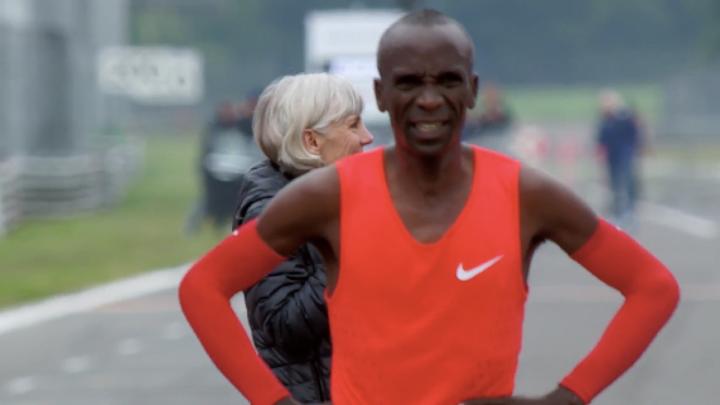Eliud Kipchoge clocks 2:00:25 marathon in Nike attempt to break two-hour barrier

Early Saturday morning, Eliud Kipchoge clocked the fastest marathon in history as he ran 2:00:25 in an attempt by Nike to break the two-hour barrier in the marathon.
The course is IAAF certified, meeting all of the criteria for a world record, but due to Nike's optimization with pacing strategy and hydration intake, the attempt will not be an official world record. The world record in the marathon is 2:02:57 by Kenya's Dennis Kimetto at the 2014 Berlin Marathon.
“The world is only 25 seconds away,” Kipchoge said after the race.
Kipchoge, ZersenayTadese and LelisaDesisa are three of the world's top distance runners and were recruited to shatter one of the last barriers in running. The attempt has been received as more of a human science experiment than an actual race by controlling variables such as pacing, hydration and 17.5 laps (each 2.4 kilometers/1.49 miles) on a specialized course on a Formula One track. Nike also set the race up as a tribute to Roger Bannister, who broke the four-minute barrier in the mile the same day in 1954.
Kipchoge entered the attempt with the third-fastest marathon time ever with his 2:03:05 from the 2015 Berlin Marathon. He also won last summer's Olympic marathon in Rio de Janeiro. Ethiopia's Lelisa Desisa previously ran 2:04:45 and won the Boston Marathon in 2013 and 2015. Eritrea's Zersenay Tadese holds the half-marathon world record of 58:23, but had the biggest chunk of time to cut with a personal best of 2:10:41. All three runners passed on racing in the lucrative spring marathons like Boston and London to run in Nike's attempt.
The pace for a 1:59:59 marathon is 4:35 per mile for 26.2 miles or running eight and a half 5K's in 14:13. Kimetto's world record was run at about a 4:41 average. An army of pacesetters, which included Olympic medalist Bernard Lagat, were tasked with rotating ever 2.4 kilometers to maintain the proper pace. Lights from a pace car helped show the pacers where to line up to match the needed speed.
Desisa was dropped from the lead pack just after the 15K mark, which may have been a result of splitting 28:21 for the first 10K. Tadese lost touch with the pacers just before the they hit 59:49 for the half marathon.
Kipchoge remained with the pacers through 35K before slowing and falling just off the sub-two pace. In certain moments, Kipchoge let out a smile or a grimace. It was hard to tell since he's smiled at the end of several of his other major victories and makes fast look effortless. By the 25th mile, pacers broke the triangle formation that they ran for most of the race to shout words of encouragement. Kipchoge pushing to the finish line alone with 400 meters remaining. He crossed the finish line 26 seconds over his goal but jogged over to embrace his longtime coach, Patrick Sang. He covered the 26.2 miles in the fastest time ever.
Tadese remained in the attempt for second place and set a personal best of 2:06:51. Desisa struggled and finished in 2:14:10.
You can watch the entire attempt below:
[youtube: https://www.youtube.com/watch?v=uvhSgxUdsdQ]
Back in 1991, Dr. Mike Joyner published a paper that said the theoretical limit of human physiology is believed to be a 1:57:58. Other experts believe that we are still possibly decades away from breaking the barrier. Joyner later backtracked on his claim and said he was just hoping to see a sub-two hour marathon in his lifetime.
The Nike attempt was not without controversy, as the sportswear company designed shoes that contain a lightweight carbon-fiber plate and claimed to give runners 4% more efficiency than the next-best Nike marathoning shoe. Nike says the shoes complied with guidelines by the International Association of Athletics Federation, track and field's governing body. The course also came into question as to whether or not it would be eligible for a world record. It was certified by the IAAF as a 26.2-mile race, but due to the nature that they were using pacers (rotating in and out every 2.4 kilometers) and the hydration zones that they set up, the race is not eligible to be ratified for a world record.
Adidas is also working on its own sub-two hour marathon plans. Sports scientist Yannis Pitsiladis heads an independent group that hopes to break the barrier with more of a focus on science.
Kipchoge will now likely return to regular racing in the fall with the possibility of returning to the Berlin Marathon. He has won seven of his eight career marathons before the Breaking2 attempt. A showdown could await with Ethiopia's Kenenisa Bekele, who now owns the third-fastest marathon time in history with his 2:03:03 at the 2016 Berlin Marathon. Bekele is working with Pitsiladis' independent group.
Nike may have failed to break the two-hour barrier but the company certainly moved the conversation forward as the quest for the sub-two continues.
Below are Eliud Kipchoge's splits for every 5K
5K: 14:14
10K: 14:07
15K: 14:13
20K: 14:15
25K: 14:14
30K: 14:17
35K: 14:17
40K: 14:27
Finish: 2:00:25

An avid runner, Chris Chavez covers track and field, marathons and the Olympics for Sports Illustrated.